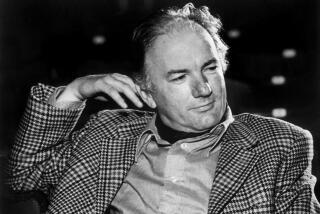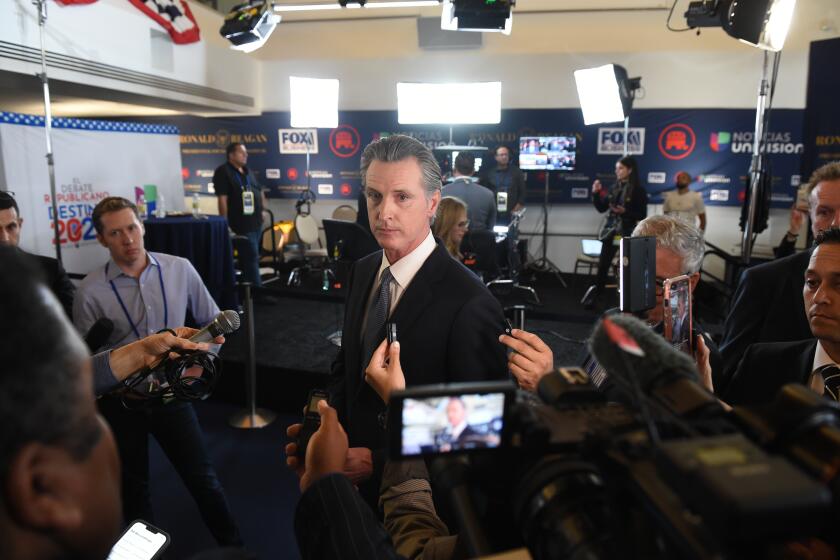‘Fire in Our Bellies, or Under Our Tails’ : THE THIRTEENTH MAN A Reagan Cabinet Memoir<i> by Terrel H. Bell (The Free Press: $19.95; 184 pp.) </i>
Terrel H. Bell took on a mission unpleasant in 1981, becoming the advocate for education in the new Reagan Administration. He was the 13th, and emphatically the last, appointee to the first Reagan Cabinet. His adversaries were the hard-line conservatives who surrounded the President in and outside the government. Working like a force of killer bees in Washington, they attacked all who dared to differ.
Their leader was then-White House counselor Edwin Meese III, who viewed federal aid for education as a costly nuisance and the new Department of Education as “a great bureaucratic joke.” Bell’s position was summed up nicely by a cartoon of the time. It pictured the empty Cabinet room, with chairs lined up around the meeting table. At the far end was one marked, “Education.” It was an electric chair.
But, if the Reaganites thought the short, kindly, white-haired Ted Bell would go quietly to his execution and that of his department, they could not have been more mistaken. Growing up poor, one of nine children of a widow from Lava Springs, Ida., had given Bell the unshakable conviction that education meant opportunity for all who were willing to work hard. During the Depression, he and his mother scraped together enough money for him to attend a teachers’ college in his hometown. “My borrowed textbooks, threadbare clothing, skimpy meals and constant apprehensiveness that I was not college material drove me to study with a dogged passion and urgency,” Bell writes in this account of his life and tenure as secretary of education.
Summing up his philosophy, he says: “To reach our outer limits, we must have fire in our bellies, or at least under our tails.”
Inside the Reagan Administration or out on stump, Bell spoke with the fire of conviction about the value of education. Most federal aid to education supports extra learning programs for poor or handicapped children. To Meese, this was another welfare program. To Bell, it was an effort to create opportunity for all.
Faced with such implacable opposition among his superiors, many officials would have quit. But, characteristically, Bell saw an opportunity. He, along with the President and most of the American public, thought the schools were in deep trouble, so he organized a commission to study the the problem. And Bell wouldn’t accept just another commission report. He wanted it to be clear, hard-hitting and addressed to the American people.
In April, 1983, the National Commission on Excellence in Education fired a rhetorical shot that was heard from coast to coast. A “rising tide of mediocrity” in America’s schools had put “the nation at risk,” said the report, which recommended a rigorous effort to raise standards for all students.
Suddenly and dramatically, Bell had changed the political focus, and Ronald Reagan was forced to spend the rest of his first term trying to catch up. Where the right-wingers had wanted to cut school spending and bring back school prayer, Bell forced them and everyone else to talk about improving education for all students.
It was a remarkable contribution to the nation and even to Reagan’s presidency. The year before, Meese had threatened to disgrace the Administration by pushing for tax exemptions for racist private academies. Without naming names, Bell tells of White House aides referring to Dr. Martin Luther King as “Martin Lucifer Coon” and calling a civil rights law for women “the lesbian’s bill of rights.” Bell’s success forced these moles deeper into the recesses of the White House, at least for a time.
But, of course, it couldn’t last. After Reagan’s landslide in 1984, the right-wingers in the White House renewed the call for deep cuts in education spending. If that was to be the sole message, Bell decided to let someone else do the speaking. Bell concludes his book with his agenda for setting the schools right and building teaching into a great profession.
His is a story of a fight well fought and a message that will outlast the Reagan Administration.
More to Read
Sign up for our Book Club newsletter
Get the latest news, events and more from the Los Angeles Times Book Club, and help us get L.A. reading and talking.
You may occasionally receive promotional content from the Los Angeles Times.







